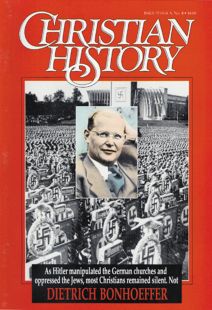Friends He Met in America
Franklin Fisher (1906–1960)
When Dietrich Bonhoeffer arrived for the 1930–31 academic year at Union Theological Seminary in New York, he had encountered few blacks during his life. Early in his Union days, he met Franklin Fisher, a black student from Birmingham, Alabama. Fisher was assigned to the Abyssinian Baptist Church for his field work, and Bonhoeffer accompanied him there. During the spring term, Bonhoeffer helped teach a Sunday school class.
Through Fisher, Bonhoeffer gained “a detailed and intimate knowledge of the realities of Harlem life,” according to Eberhard Bethge. On one occasion Bonhoeffer and Fisher were together in a restaurant, and it became clear that Fisher would not be extended the same service. In disgust, Bonhoeffer led the party outside in protest.
After 1931, the two friends did not meet again, but Bonhoeffer spoke of Fisher to his Finkenwalde students, to his family, and others. Wolf-Dieter Zimmermann, one of those students, reports that after an evening of playing Negro spirituals, Bonhoeffer said: “When I took leave of my black friend, he said to me: ‘Make our sufferings known in Germany, tell them what is happening to us, and show them what we are like.’ I wanted to fulfill this obligation tonight.”
Fisher served as pastor of the West Hunter Street Baptist Church in Atlanta, and then as dean of the National Baptist Sunday School and Baptist Training Union Congress. He also taught in the School of Religion at Morehouse College. Unfortunately, at his death in 1960, he did not leave any written record about his friendship with Bonhoeffer.
Jean Lasserre (1908–1983)
When Jean Lassere, a pastor of the French Reformed Church, met Dietrich Bonhoeffer, neither spoke the other’s language, so they communicated in English. They shared deep theological conversation as well as social experiences.
Especially significant for Bonhoeffer, the friends grappled with the claims of Christ’s peace commandments, along with the Sermon on the Mount. Without question this provided motivation for Bonhoeffer to write The Cost of Discipleship.
In the spring of 1931, Bonhoeffer, Lasserre, and two other Union friends set out for Mexico in an old car. Lasserre commented later: “We shared the same things and hours and hours of driving together and looking for the hotel room and making our own cooking very often. So I have seen him and known him on a very human level . . . He would never forget his high thoughts. And it was very easy to come back to theology and philosophy.”
After returning to France, Lasserre served several congregations in the Reformed Church. He became deeply involved in battles against racism, alcoholism, prostitution, and militarism. His book War and the Gospel (Herald Press, 1962, 1974) is a classic statement of Christian pacifism.
The two friends met briefly in 1932 and in 1934 at the ecumenical conferences in Fan, Denmark. They exchanged many letters. Unfortunately, Bonhoeffer’s letters were all burned; Lasserre was a member of the French resistance, and it was too dangerous to retain his friend’s correspondence.
Bonhoeffer remembered Lasserre for posterity when he wrote from Tegel Prison: “I remember a conversation that I had in America thirteen years ago with a young French pastor. We were asking ourselves quite simply what we wanted to do with our lives. He said he would like to become a saint (and I think it is quite likely that he did become one). At the time I was very impressed, but I disagreed with him, and said, in effect, that I should like to learn to have faith.”
Later, Jean Lasserre could not remember this conversation. Moreover, he denied emphatically that he ever became a saint.
Reinhold Niebuhr (1892–1971)
When Reinhold Niebuhr died, Time eulogized him as “pre-eminent in his field, the greatest Protestant theologian in America since Jonathan Edwards.”
After a thirteen-year pastorate at the Bethel Evangelical Church in Detroit, Niebuhr arrived at Union Theological Seminary in New York where he taught for more than thirty years as professor of applied Christianity. His Leaves from the Notebook of a Tamed Cynic, Interpretation of Christian Ethics,Moral Man and Immoral Society, Nature and Destiny of Man, and other writings made an indelible impact on the church.
As a “German fellow,” Dietrich Bonhoeffer sat in Niebuhr’s classroom. They mutually respected and criticized each other’s perspectives, and they corresponded frequently during the 1930s. Niebuhr was influential in obtaining an invitation for Bonhoeffer to come to the U.S. for teaching and lecturing in 1939. Bonhoeffer, however, made a decision to return after only a few weeks. His letter of explanation has become a model for following conscience: “I have come to the conclusion that I have made a mistake in coming to America. I must live through this difficult period of our national history with the Christian people of Germany. I will have no right to participate in the reconstruction of Christian life in Germany after the war if I do not share the trials of this time with my people.”
By F. Burton Nelson
[Christian History originally published this article in Christian History Issue #32 in 1991]
Dr. F. Burton Nelson is professor of theology and ethics at North Park Theological Seminary in Chicago, Illinois, and co-author of A Testament to Freedom: The Essential Writings of Dietrich Bonhoeffer (HarperCollins, 1990).Next articles
Pastor Bonhoeffer
Though known as a theologian and resister, Dietrich Bonhoeffer was also a pastor—even in his final moments.
F. Burton NelsonMy Friend Dietrich
His closest companion reflects on the meaning of Bonhoeffer’s life for us today.
Eberhard BethgeDietrich Bonhoeffer: Recommended Resources
Resources for further study of Bonhoeffer and his times.
the EditorsChristianity and the Civil War: Did You Know?
Little-known or remarkable facts about Christianity during the American Civil War.
the Editors



